By the SMU Social Media Team
They are great on their own, but even more brilliant together. Vidyarth Srivatsan, 30, and Aarthi Sridharan, 29, are top students of the prestigious IE-SMU MBA programme, and also happen to be married to each other. Power couples are a dime a dozen these days, but hardly in the academic context. Much less in this rigorous programme, which brings together two elite educational institutions to preparing top professionals for complex leadership challenges. The programme provides a unique experience by fusing a global curriculum, provided by IE Business School, with an Asian perspective, perfected by SMU.
We chat with the couple—Aarthi is in the semiconductor industry and Vidyarth is in digital video advertising—on what helped them achieve such success, the challenges they have faced, and how they have grown together.
It’s amazing to find out that a husband and wife have both clinched the top positions of the IE-SMU programme in consecutive years. Share with us, what compelled you both to join the programme?
Vidyarth: The reality is that although we did the programme in the years 2014–2015, our story began in the summer of 2012 when Aarthi decided to work on diversifying her career by going the MBA route. After mulling over a few options and several discussions, we both determined that part time programmes were the way to go ahead as neither of us wanted to take a break and switch gears. Given how our working styles have veered toward the digital, we very much preferred an MBA that was representative of that. And it so happened that IE Business School partnered with Singapore Management University to come up with a blended programme in 2014, which suited our needs. Given the double value of the networks in Asia and Europe that we stood to gain, we took the plunge.
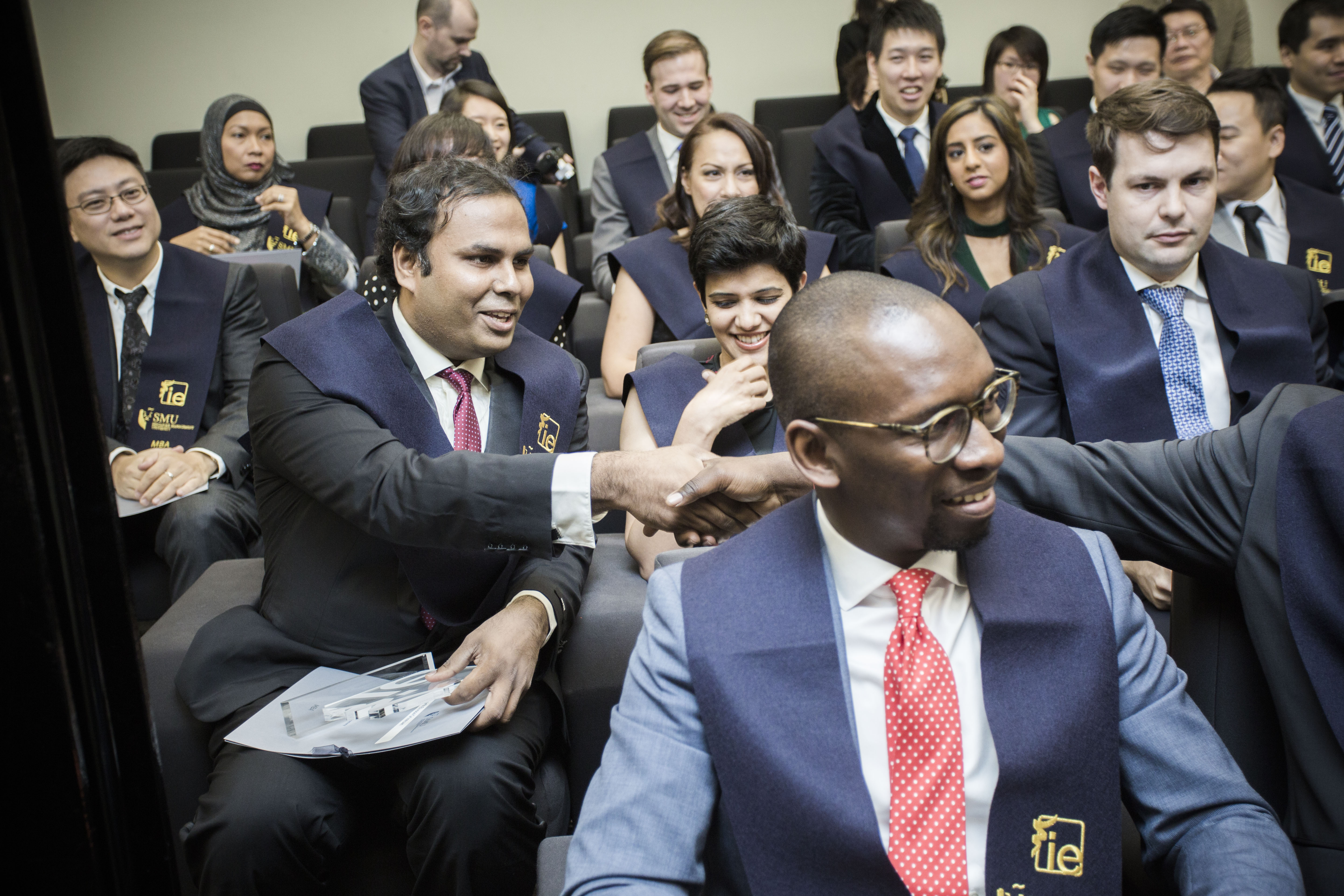
Fellow course mate congratulating VIdyarth on coming in as top student during their graduation on October 2016
Can you each share more on your individual experiences in the programme?
Aarthi: The IE-SMU MBA experience was simply amazing. How often can one have scenarios where you get to work with a Psychology major from Philippines, an entrepreneur from Indonesia, a project manager from Japan, a Swiss Banker, and collaborate with some of the top lecturers from both the East and West to solve interesting problems? What’s better is when you make life-long friends from such an international and diverse background. Yes, I had this opportunity and I count myself lucky to be a part of it. For someone who was unaware of the ABCs of online collaboration, it is now a breeze to work with tools like Adobe Connect, and I practically used that to meet my peers and clients online. Learning to work well with constraints of the differences in time zones is one of the practical challenges of this century and something that this course has subtly taught us.
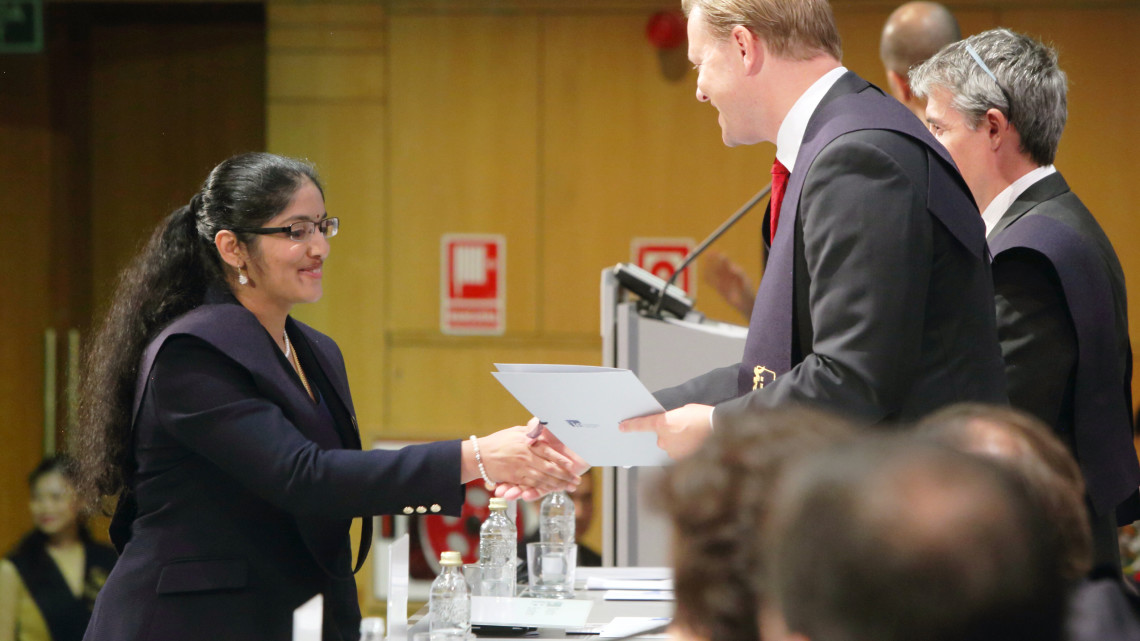
Aarthi was the top student among the very first batch of IE-SMU MBA graduates in July 2015.
Vidyarth: The programme was a busy but fun ride. I have learnt several things that I didn’t know much about before from double entry accounting and decoding broken economies, to communicating around crisis scenarios and improving operations. The professors were really world class and were very adept in helping us learn a lot using the blended structure. More importantly, I learnt every day from my colleagues—a serial entrepreneur from Colombia, smart oil and gas executives preparing for the future, an Apple employee and more. It was a competitive and yet symbiotic class. Learning through the online campus was very fun and enriching and in this digital age it was all the more intuitive.
How have your experiences differed, and where are they similar?
A key similarity in our experiences was the exposure to globally and functionally diverse group of colleagues and professors, which is a huge credit to the blended nature of the programme and the reputation of the universities involved. The amount of knowledge condensed in the program and its up-to-date digital nature was something we both enjoyed. Beyond the superficial differences, the whole program lasted about 10 months in 2014 (when Aarthi did the programme) and about 13 months in 2015 (when Vidyarth did the programme). Ten months was a touch too crazy and we remember Aarthi juggling several things towards the end, but thankfully the programme management has been very receptive of feedback, and Vidyarth had a less cramped schedule.
Beyond that, we were both involved in consultation stints with companies to gain practical experience during the programme. While Aarthi was involved with helping a non-profit start-up create sustainable business models, Vidyarth was involved in helping a global electronic healthcare company plan its market entry in Asia Pacific markets. The nature of the two projects was quite different and entailed a lot of lessons learnt the hard way. Yet the programme’s stress on having a method behind all the madness drove both of us to figure out means to systematically find solutions.
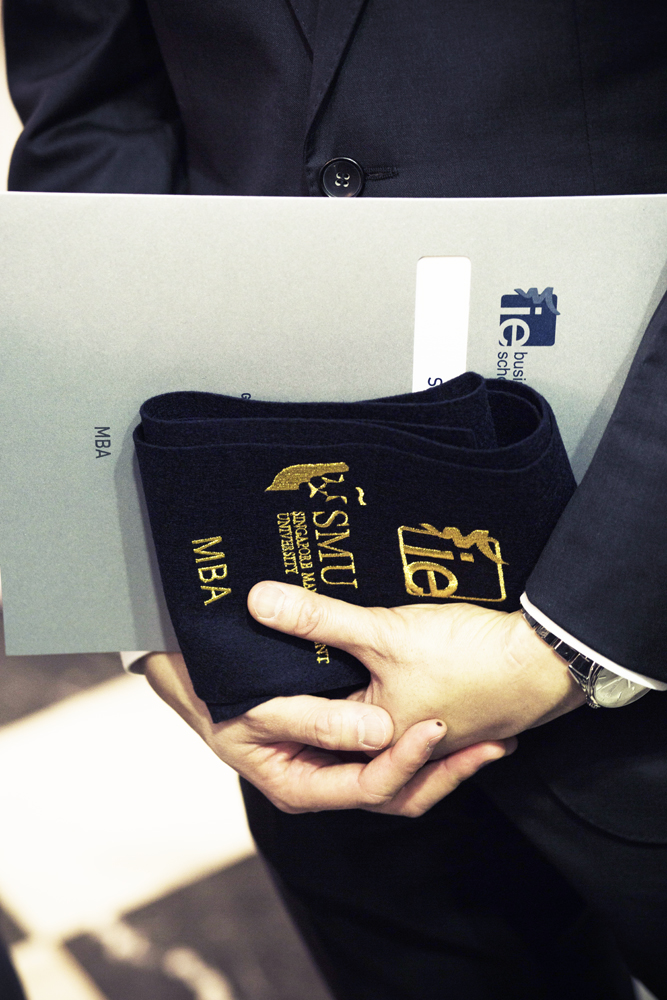
Has the fact that you are a couple impacted how you performed in the programme?
Definitely, yes! This programme is deceivingly intense. Many might mistake this programme to be relatively light like many part-time programmes. But this programme condenses the quality of a full time programme and delivers that in a year taking advantage of digital tools and focused face-to-face sessions. Luckily, we understood that from the outset, and decided that we will both do the programme one at a time, so that the other can provide support. This shared mission proved to be a master stroke as we both assisted each other running the home, while the other does the MBA (although it did mean Aarthi had to taste the rather less accomplished cooking of Vidyarth). This support meant we could take refreshing breaks when we needed them the most through trips to Cambodia, India and even staycations.
What would a typical day in the life of an IE-SMU MBA programme student look like for each of you?
Aarthi: I am typically like an owl doing my most productive work at night. Since my workday starts really early, I spend very limited time in the morning and about a couple of hours every late evening on the week’s studies. I spend my Saturdays completely on the programme, studying for the classes in the morning, and have my meetings on Saturday afternoons and Sunday mornings beyond having my regular video conference sessions on Saturday evenings. Sunday evenings are when we plan to do something fun and relax before the week begins again.
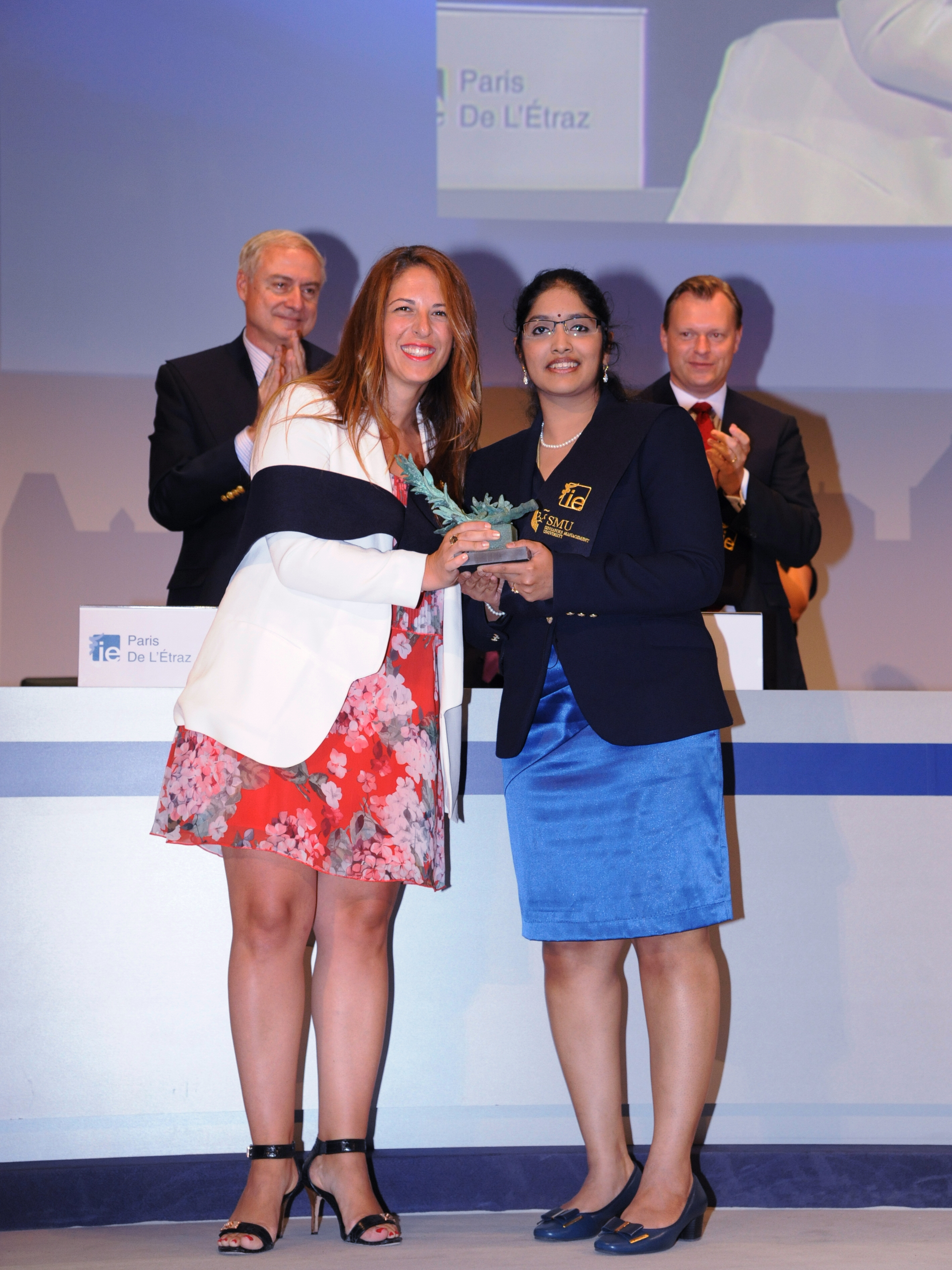
Aarthi receiving her top student award
Vidyarth: A typical weekday during the programme starts at six in the morning with an hour or so on the forums where you discuss the week’s cases with the class asynchronously. Then workday begins in the afternoon (around lunch) and another hour after work going into forums again. Then late in the night I juggle some time between having late night calls with my office counterparts in the States, and studying for the following week’s cases and team projects. During the weekend, I continue some studies early on Saturday morning and then have Video Conference classes on Saturday evening and MBA groups meetings around it. But beyond that I try my very best to go out with my wife to some place fun and enjoy the limited down time we have.
How has the programme impacted your life together?
The programme’s impact on our careers is obvious. But we have always dreamt of building our own start-up at some point. This programme has definitely equipped us with right networks and skills to do our best on that route.
What are some challenges you have faced, and what are some small successes you’ve enjoyed together?
Obviously managing time and balancing work-study-life has been a big challenge, but working that out has expanded the scope of what we can do every single day. We feel there is more time every day for us to do more things now. The very fact that we could pull through the programme one after the other without much burden thanks to scholarships and support from our companies has been a great success. But to do that as the best students across the board (Aarthi even topped all of IE’s MBA programmes) is definitely the icing on the cake. Even more critically for us, is to have put forward what we have learnt in real time in consulting projects and help real companies. That was a hugely satisfying success.
Are there some examples of power couples that you both look up to?
In what aspects have they inspired you? While there have been many inspiring personalities for the both of us, there is one power couple that has had a lasting impact on us—the makers of the innovative one-minute robotic chapati making machine, Rotimatic, Pranoti Nagarkar and Rishi Israni who were even highlighted by Singapore Prime Minister Lee Hsien Loong.
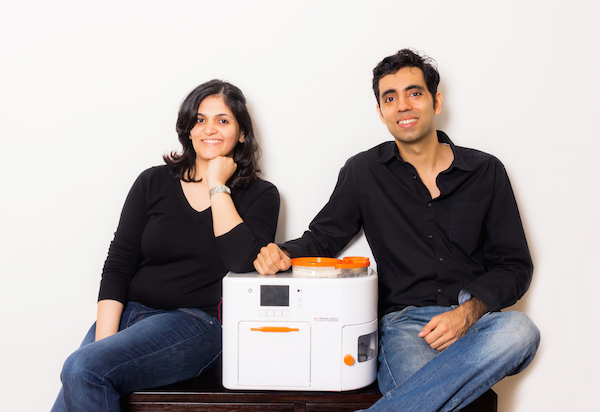
Pranoti Nagarkar and Rishi Israni with their Rotimatic machine. (Source: crazyengineers.com)
Pranoti and Rishi had iterated over 15 times over 8 years to build the current design of roti maker. Pranoti, a mechanical engineer by training had come up with the initial prototypes in 2009 (winning the Startup at Singapore competition back then). Her husband brought his prior entrepreneurial experience in and pushed the idea forward. The resilience and symbiotic nature of that partnership has served as a great inspiration for us to look up to and emulate in our own way.
What are your future plans, now that you’ve both graduated from the IE-SMU MBA programme?
The MBA is a great stepping-stone for our individual careers. We are both equipping ourselves to eventually lead our way to make a meaningful impact on the world. The hows are not clear yet, but with the expanded global reach and new skills gained we look forward to figuring out the remaining pieces of the jigsaw and crack our full potential. The path to our success so far has been with its fair share of difficulties as well, so we also look forward to helping people who are at similar crossroads as we were before embarking on this journey, and in some ways give back to the programme itself.
Find out more about the IE-SMU MBA programme here.
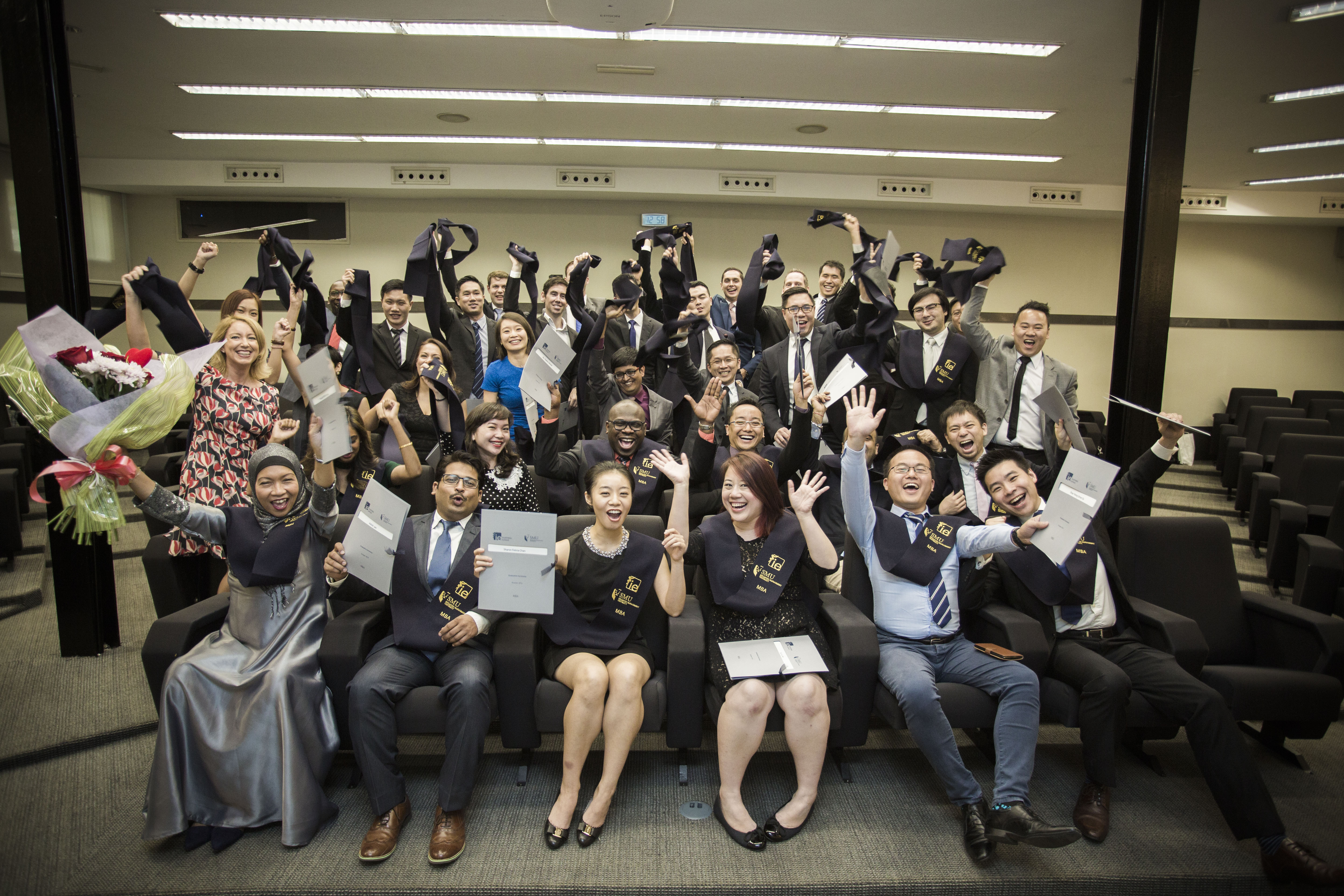
IE-SMU MBA graduating class of 2016














